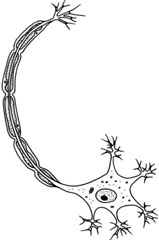|
|
 |
| Neurology |
 |
 |
 |
|
|
|
|
|
|
|
|
|
Neurology
is the branch of medicine that is concerned with the
study and treatment of disorders of the nervous
system.
|
 |
|
|
|
|
|
Blakiston's Medical Dictionary defines neurology as the
study of the anatomy, physiology, and pathology of the
nervous system, and the treatment of its disorders. This
course will include all of these components although in
a single semester, of course, we will just skim the surface of this
content. We will cover the gross anatomy and
organization of the nervous system, paying particular
attention to the function of the component parts and
systems. Unlike a traditional neuroanatomy course we
will not have the opportunity to do dissections or spend
time on the microscopic or detailed internal anatomy,
but will instead relate neuroanatomy to the control of
behavior. While most medical school courses on
"neurology" are devoted almost entirely to diseases and
disorders of the nervous system, we will use common
neurological problems as a means of understanding normal
nervous system function. Since this course draws many
students who hope to pursue a variety of helping
professions, it is hoped that this coverage will provide
the basis for understanding the neurological disorders
and treatments you might encounter in your careers.
of course, we will just skim the surface of this
content. We will cover the gross anatomy and
organization of the nervous system, paying particular
attention to the function of the component parts and
systems. Unlike a traditional neuroanatomy course we
will not have the opportunity to do dissections or spend
time on the microscopic or detailed internal anatomy,
but will instead relate neuroanatomy to the control of
behavior. While most medical school courses on
"neurology" are devoted almost entirely to diseases and
disorders of the nervous system, we will use common
neurological problems as a means of understanding normal
nervous system function. Since this course draws many
students who hope to pursue a variety of helping
professions, it is hoped that this coverage will provide
the basis for understanding the neurological disorders
and treatments you might encounter in your careers. |
|
|
|
|
|
"Gentlemen, look on this wonder!
Whatever the bids of the bidders,
They cannot be high enough for it;
For it the globe lay preparing quintillions
of years, without one animal or plant;
For it the revolving cycles truly and steadily roll'd.
In this head the all-baffling brain;
In it and below it, the makings of heroes."
- Walt Whitman - I Sing the Body Electric, 1855 |
|
|
A neurologist is a medical doctor or osteopath who has
trained in the diagnosis and treatment of nervous system
disorders, including diseases of the brain, spinal cord,
nerves, and muscles.
Neurologists perform neurological examinations of the
nerves of the head and neck; muscle strength and
movement; balance, ambulation, and reflexes; and
sensation, memory, speech, language, and other cognitive
abilities. |
|
|
Neurologists also perform diagnostic tests such as the following:
following:
* CAT (computed axial tomography) scan
* MRI/MRA (magnetic resonance imaging/magnetic resonance
angiography)
* lumbar puncture (spinal tap)
* EEG (electroencephalography)
* EMG/NCV (electromyography/nerve conduction velocity) |
|
|
|
|
|
|
|
Disclaimer - The
contents of this site are for informational purposes
only. Always seek the advice of a qualified
physician for any doubts. |
|
| |


